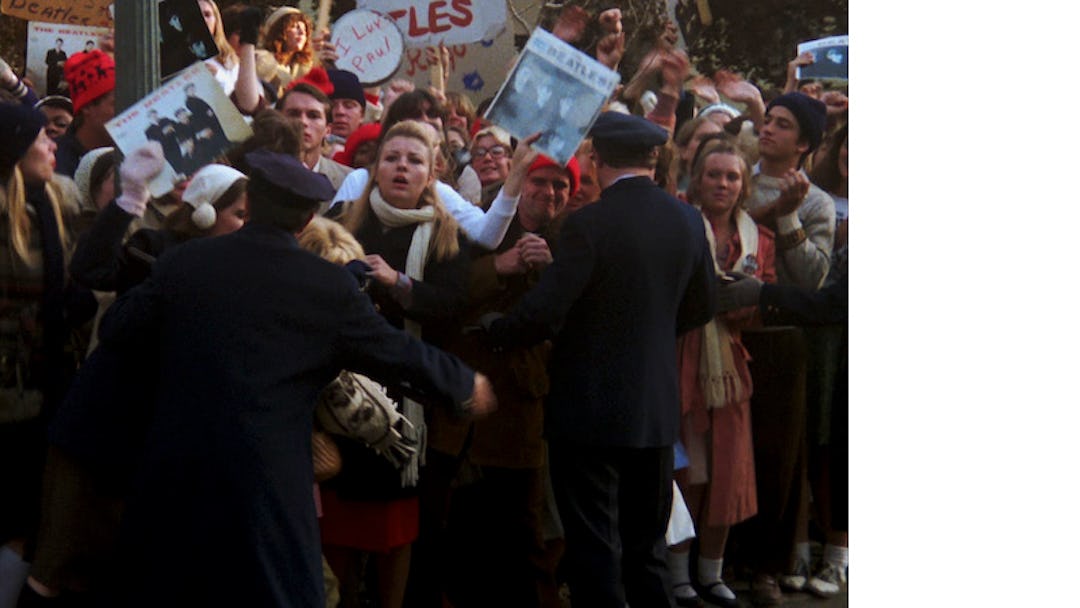Welcome to “Second Glance,” a bi-weekly column that spotlights an older film of note (thanks to an anniversary, a connection to a new release, or new disc or streaming availability) that was not as commercially or critically successful as it should’ve been. This week, following the release of Robert Zemeckis’s 18th feature, we look back at his first.
One of the greatest pleasures of this fall film season has been the return to form of Robert Zemeckis, on display last weekend in his new film Allied. No one was more surprised by its quality than this viewer; his recent efforts (following a woefully ill-advised, decade-long crawl through the muck of CG animation) have, for the most part, been stodgy machines that lumbered through maddeningly predictable narratives. But his early pictures were wild and unruly, spinning tops perpetually on that final wobble, yet never quite slowing down or peeling out, and that holds particularly true of his fun, fab 1978 picture, I Wanna Hold Your Hand.
It was Zemeckis’s first feature credit, both as director and co-writer – and the first of several collaborations with screenwriter Bob Gale. It’s set in and around New York City on February 8 and 9, 1964, the hours up to and including the Beatles’ legendary appearance on The Ed Sullivan Show; specifically, it focuses on a handful of friends from New Jersey who’ll go to any lengths to meet their idols. Their fandom takes on different forms and intensity, and they work out a variety of tactics, first to worm their way into the Fab Four’s hotel, and then to finagle tickets to the Sullivan performance.
So it’s something akin to a caper movie, with various plans for dodging cops, bribing security, sneaking into service elevators, and hiding under beds. Zemeckis is careful to infuse all of these events with the energy and spirit of the Beatles’ own film from the period, A Hard Day’s Night; in the big crowd scenes of rampant Beatlemania, he even apes some of the compositions and cutting of that film’s similar sequences. It’s a smart move. Only steal from the best.
What’s most interesting about the movie, in retrospect, is how it dispels the notion that quick nostalgia is a recent phenomenon – the events fictionalized and dramatized here were only 14 years removed, but they’re presented very much as The Past. (Its proximity to those events also probably explains how they managed to secure 17 Beatles recordings, which would become prohibitively expensive in the years to come.) But this is no surprise; culture moved awfully quickly in the late 1960s and early 1970s, and by the time Hand hit theaters in 1978, the innocent period it was portraying must’ve seemed lifetimes removed. Its spirit, too; these were “crisis of confidence” days, and here was Zemeckis with a movie that was cheerful and sunny and giddy, a paean to the joys of pop music and shared fandom.
That last idea is key to one of the best lines in the movie. Wild-eyed Rosie (sitcom fave Wendie Jo Sperber) finds herself trading trivia and gawking at artifacts with geeky Richard (perpetual movie uber-nerd Eddie Deezen), finally announcing, “Y’know, you’re the first boy I ever met that I could really talk to!” It’s a funny moment – Sperber’s timing and enthusiasm are flawless – but it’s also a true one, getting at how, at our most awkward ages, the things we love become the easiest way to communicate with our contemporaries, particularly those of the opposite sex.
(Criterion)
Of course, fandom can get out of one’s control, which is what happens in the picture’s most entertaining subplot. Pam Mitchell (the great Nancy Allen) is really only tagging along with her friends, in lieu of a bachelorette party; she’s planning to elope the following evening. But she’s the one who actually makes it into the holy sanctuary of the Beatles’ hotel room, and her semi-orgasmic ecstasy as she lays hands on their instruments, their dishes, and their hair is a rich comic gift that keeps on giving. By the time she’s in the Sullivan audience, her reaction to their music and physicality is so sexualized, it nearly calls the film’s PG rating into question.
But before she’s caressing her upper thighs to the sounds of “She Loves You,” she’s confronted by her baffled fiancé, who reprimands her sternly: “You are going to have to start acting a little more responsible.” This makes him the villain, obviously; this is a film about the joy of being young and a little bit crazy, ruled by the organizing principle of all Zemeckis and Gale’s early work: barely controlled chaos. It’s all over the following year’s 1941, which they wrote for Steven Spielberg (who’s credited as executive producer of Hand, and cast four of this film’s players in 1941); it comes to full roar in 1980’s deliciously vulgar Used Cars.
But none of those films were hits, so after Zemeckis found success as a hired gun on Romancing the Stone, his next collaboration with Gale, 1985’s Back to the Future, tempered that chaos to a more manageable, audience-friendly speed. It worked, and Zemeckis became one of our most financially successful filmmakers. But he’ll never work as wildly as he did in those early pictures again, and that’s both his and our loss.
I Wanna Hold Your Hand is available for purchase or rental on DVD.
